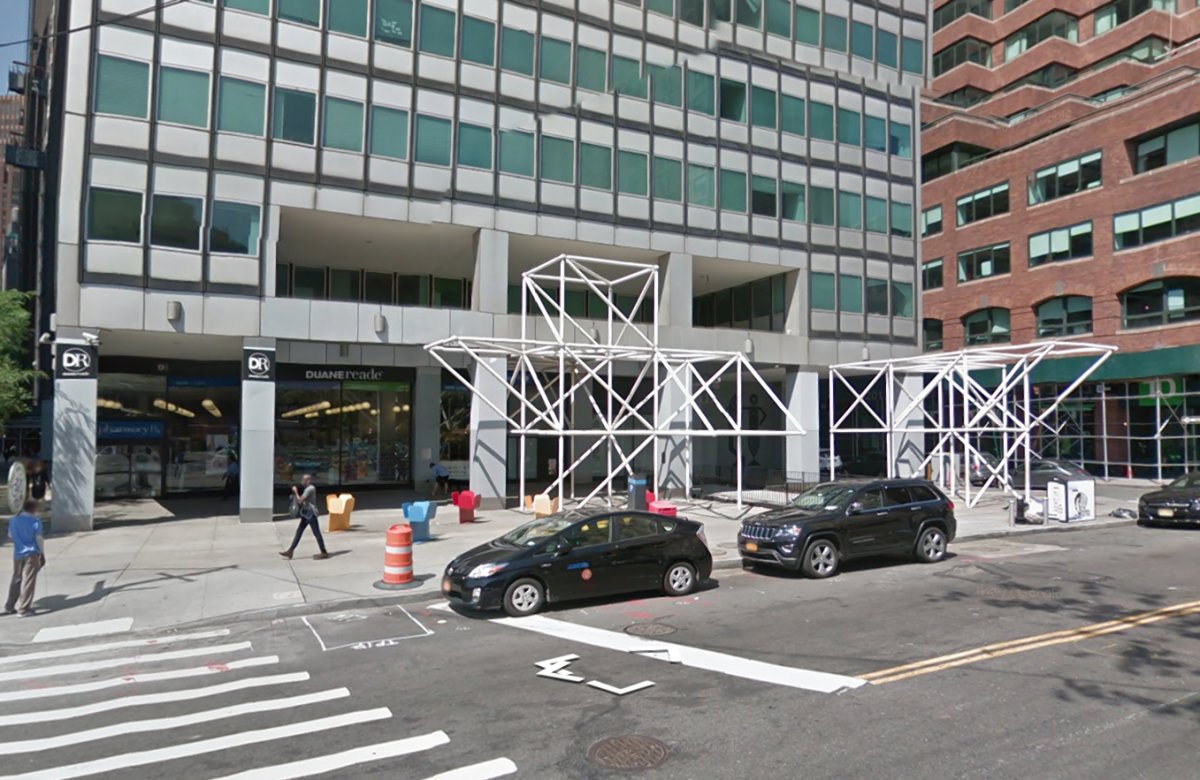
Locals say the Department of City Planning is improperly promoting a controversial arcade infill plan on behalf of the owners of 200 Water St.
BY COLIN MIXSON
A city agency is shamelessly promoting a Downtown landlord’s scheme to redevelop public land for private profit, locals claim.
The Department of City Planning, which was tasked with providing an impartial review of Rockrose Development’s application to convert arcade space at 200 Water St. into ground-floor retail and luxury apartments at an important hearing on Nov. 13, spoke of the plan in glowing terms while failing to mention any drawbacks to the hugely controversial proposal or the widespread public opposition, according to a member of Community Board 1.
“There was no mention of the extraordinary amount of opposition,” said Alice Blank, a Downtown resident and architect. “The Department of City Planning is working in lockstep with the applicant to push forward this application.”
Rockrose has applied for city permission to enclose more than 4,700 square feet of public space at the building between Fulton and John streets — which a previous landlord created in the 1970s in exchange for permission from the city to build higher — in a deal that a CB1 resolution described as providing “no adequate compensating amenity.”
The City Planning Commission, a 13-member panel of mayoral and borough president appointees, will be asked to vote on the proposal sometime in the coming weeks, but the group will rely largely on a presentation provided by Department of City Planning rep Richard Suarez last month, which opponents argue was slanted in favor of the developer.
Suarez spoke for about five minutes at the Nov. 13 hearing on the general parameters of Rockrose’s application, and mentioned that the community board and Borough President Gale Brewer both opposed the plan, albeit without explaining why.
Following his introduction, Suarez admitted that most presentations would have ended there, before continuing for more than twice that time discussing the text amendment the agency authored last year to allow landlords along Water Street to redevelop such privately owned public spaces, or “POPS,” without public review — and how Rockrose’s plan would supposedly benefit the community.
“Normally we would stop here,” Suarez said, “but we thought it would be good to give the commission a refresher on the 2016 text amendment, what the goals were and what it was intended to do, and then a review of the 200 Water Street project … how the proposal fits into the goals of that text.”
Suarez also briefly mentioned other written testimony sent from various community groups and non-profit advocates for the commission to review, which the agency forwarded to members on the weekend before the Monday hearing.
Those letters, which represented numerous organizations opposed to the plan — including The Municipal Art Society, Friends of the Upper East Side, Landmarks West, Tribeca Trust, Upper East Side Historic Districts, Friends of POPS, Civitas, and City Club — were actually forwarded to the Department of City Planning about a month before the review session, and the groups are furious that the agency waited so long to pass them off to the commission.
“We sent it a month or so ahead of time, and then they held that stuff until just before the review session,” said John West, an urban planning consultant and member of City Club.
The apparent withholding of information was reflected by the’ responses following Suarez’s presentation, according to West, with only one of the 13 commissioners noting the community’s overwhelming opposition to Rockrose’s application.
“My observation is that this has run into a fairly extraordinary amount of opposition from various folks out in the community, both immediately local and further afield, — and, for me, at least, the cumulative impact of their arguments has made an impact,” said Commissioner Anna Levin at the hearing.
A spokesman for the Department of City Planning claimed the agency had done its due diligence insuring commission members were briefed, and noted the panel still has time to review the testimony before it votes on the proposal.
“The CPC is aware of the many points of view on the 200 Water Street proposal, which has received the same thorough and thoughtful review and has been subject to the same protocols as other similar applications,” said Joe Marvilli. “Furthermore, the commission has not yet taken action on this item.”
Now, advocates aren’t only concerned about the future of Water Street, but how the Department of City Planning could be putting its thumb on the scales to influence the commission on other controversial projects throughout the city.
“If it happens here, is it happening elsewhere?” said Alexander Adams, executive director of Civitas.
































